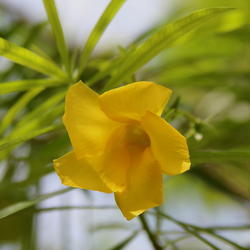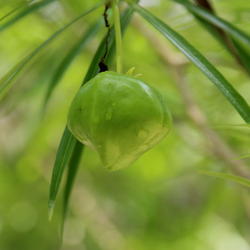Do you have a favorite place to visit, one that lifts your spirits? I have one, a small public garden tucked between the ocean and the intercoastal waterway here in northeast Florida. I have been going to this little out-of-the-way spot for many years. Join me as we take a short trip to Washington Oaks State Gardens.
Let's travel down the East coast of Florida along A1A, pass through St. Augustine and then after driving another 20 miles, we come to Washington Oaks Gardens. Parts of the park's 389 acres are still a perfect example of the original habitat of a northeast Florida barrier island: beach, coastal scrub, coastal hammock, and tidal marshes. Half of it is to our left toward the ocean and half is on our right. We will take a quick trip to the beach before we leave, but for now let's go into the park. The native vegetation we'll see includes southern live oaks (Quercus virginiana), magnolias, hickories (Carya spp.), cabbage palmettos (Sabal palmetto), and saw palmettos (Serenoa repens). There are some lovely examples of the Live Oaks in the Gardens. I will try to point out some of these as we are walking.
Keep an eye out for the wildlife that abounds here, we may see sea turtles or their tracks on the beach; Florida Gopher Tortoises can be found throughout this area. West Indian Manatees can be sighted in the intercoastal waterway. Dolphins can sometimes be seen playing there also, along with white-tailed deer who love to munch on garden plants. If we are lucky and arrive very, very early we might see raccoons, bobcats, foxes, Virginia opossums, but the odds are slim. We are more likely to see Eastern gray squirrels, pileated woodpeckers, northern cardinals, bald eagles, peregrine falcons, the rare Florida scrub jays, many shore birds and other migratory birds that make this one of their stops each spring and fall. There are lots of frogs around the stream. Please watch where you put your feet as there are snakes around, but don't worry, most are harmless.
First, I'd like to tell you a little history about this area. Long before the White Man came, the Native Americans hunted, fished and gathered shellfish here. The hill at the top of the Rose Garden is a midden. The first person to settle here was John Moultrie, Lieutenant Governor of East Florida. In 1770, when the British government granted the land to him, Moultrie mined the heaps of oyster shells to produce lime in his lime kiln; he also established an orange grove. Oranges are still grown here in the park and no, we are not allowed to pick them.
In 1793 a fire swept over the tract and shortly afterwards a Portuguese-born merchant took over the area. He constructed some buildings and historians think he grew rice and corn.
In 1818, Jose Mariano Hernandez, a native of Minorcan descent, bought the land. He named it "Bella Vista." He owned several tracks of land on which he raised cotton, sugar, and crops to feed his family, workers, and slaves. Bella Vista adjoined his cotton plantation to the south. After Florida became the property of the USA he changed his name to Joseph Marion Hernandez. He served the state in the territorial legislature in Tallahassee and served as the first representative from the Territory of Florida to the U.S. Congress. He was called General Hernandez because, as Brigadier General, he organized and commanded the militia before and during the Second Seminole War (1835-42).
In 1845, Hernandez's daughter, Luisa, married George Washington. Not that Washington, but George Lawrence Washington, a distant cousin to the other George. They never built a home at Bella Vista but instead, lived in St. Augustine.
In 1936 Louise Powis Clark bought the land as a winter retirement home for herself and her third husband, Owen D. Young. They named the land Washington Oaks, built a home, started the gardens and added the beach front property. Shortly before her death in 1965, Mrs. Young gave most of Washington Oaks to the State of Florida. She specified that the gardens be "maintained in their present form" and expanded as funds become available.
Now comes the part that we have traveled to see, the beautiful gardens. Are your cameras ready?
Do you have a favorite place to visit, one that lifts your spirits? I have one, a small public garden tucked between the ocean and the intercoastal waterway here in northeast Florida. I have been going to this little out-of-the-way spot for many years. Join me as we take a short trip to Washington Oaks State Gardens.
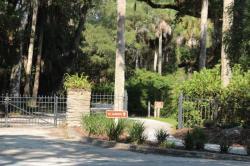
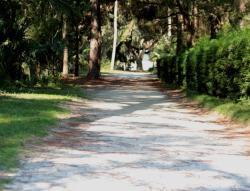
On the left we see a Gopher turtle and just a little beyond it is a Cabbage Palmetto. It is a young one; when it gets older the trunk will be clean and smooth. This is the tree that we get the Cabbage Palm from but this kills the tree so I am glad that these are protected.
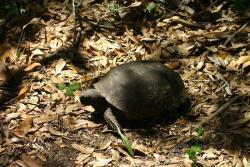
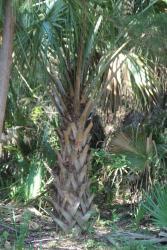
This is a coontie, Zamia pumila, a plant that has been around since the time of the dinosaurs. It was a very important food plant for the Native Americans. They cut up the roots, pounded them into a powder and then washed the powder over and over again. It was femented before being baked. I've always wondered how it tasted.
On one tree there is a caterpiller of the Echo Moth, Seirarctia echo, a beautiful little moth that looks to be wearing a cape with fur around its shoulder. In parts of Florida the lovely butterfly, Atala (Eumaeus atala) uses this plant as a host for it's young.
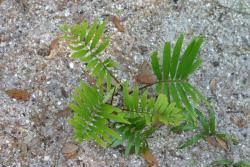
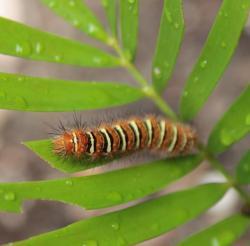
There are lots of trails that take us through the natural part of the park; there is one off to our left that leads up to the Interpretation Center. If you look up in this Live Oak tree to our left you will see a lot of Resurrection, I am glad to see that the recent rain has greened it up nicely for your visit. That patch is very old.
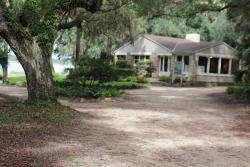
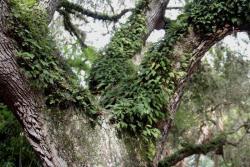
The Intercoastal Waterway is straight ahead. They are conducting a fishing clinic; they do this often
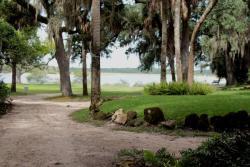
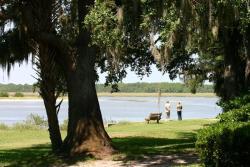
We will now continue to the right, past the building. If you need a stop there are restrooms and a water fountain available. Here is a tiny garden and I love these little Bromeliads; they are possibly Neorelelia 'Zoe'. Now lets continue down this path.
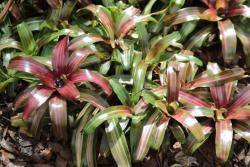
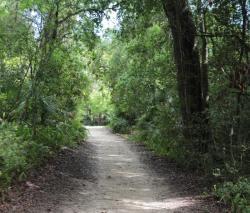
The small hill we are coming to is the remains of the midden. At the top is the plant Thevetia Peruviana, also called Lucky Nut or Mexican Oleander. The flowers of these plants are either yellow or a soft orange color and they have a strange fruit.
And here is the beautiful Rose Garden, the fence is to keep out the deer. Let's spend some time enjoying the blooms.
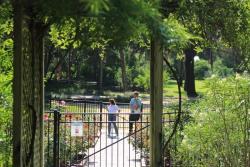
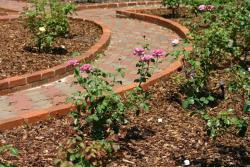
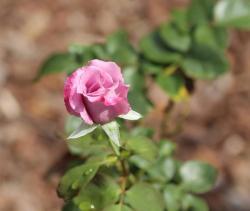
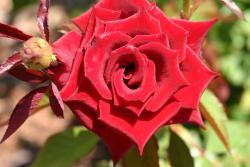
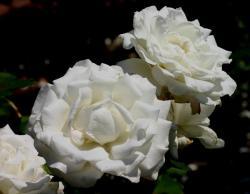
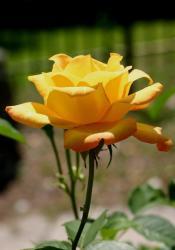
Before we leave the Rose Garden, take a look at the vine on the fence, it is Thundergia laurfolia, a tropical vine, but one that has done well here.
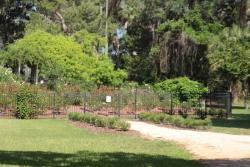
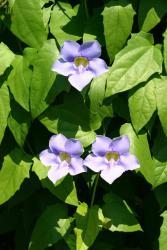
You will see many more tropical plants in this garden. They are protected by the warmth from the ocean and the intercoastal waterway during our winters; even last year's hard freezes only damaged some of them. They have come back as strong as ever. Have you noticed the cages around some of the trees? That is to protect them from the deer and perhaps from sticky fingers when people reach for the oranges.
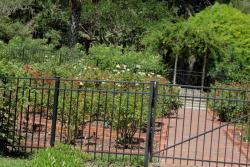
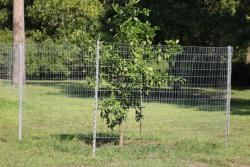
We will turn to the left along this path up ahead. There are many plants that have been here a long time. If you look to your right you will see the Bird of Paradise, one of the Strelitzias. That plant is over 20 years old
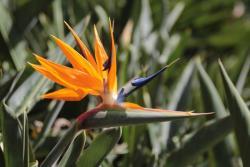
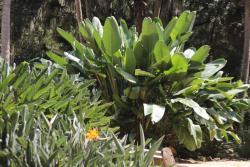
Behind it is a different varity of Strelitzia and on the other side of the path is what I think is a Musa, an ornamental banana. One of these days I hope to be here when the master gardener is around and I will learn the names of more of these plants. On the left you see Philodendron bipinnatifidum, this "house plant" is taller than I am. The one on the right is Schefflera arboricola, one of the variegated varieties. As you see, there is row of them along this path
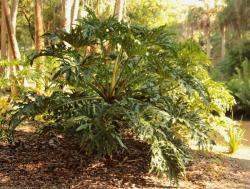
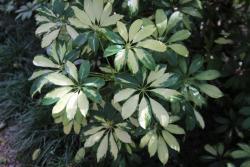
Waterways meander throughout the gardens. This stream is fed by an artesian spring; it has a strange scent.
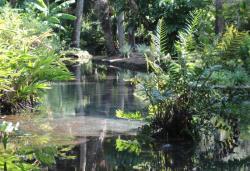
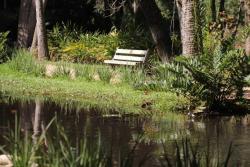
Here's a nice place to sit and enjoy the peace of nature. Please join me next time as we wind our way through the rest of Washington Oaks Gardens.
To be continued.












